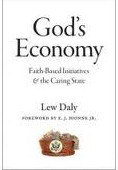
God's Economy: Faith-Based Initiatives and the Caring State
Lew Daly
344 pages, University of Chicago Press, 2009
In God’s Economy, Lew Daly has written perhaps the most complete chronicle of the legal and policy foundations of former President George W. Bush’s Faith-Based Initiative. Eschewing polarizing diatribe for rigorous historical scholarship, he provides deep insights into the Catholic and Dutch Reformed philosophies that guided the initiative, and puts forth a plausible framework for future faith-based policy.
But like the Faith-Based Initiative itself, God’s Economy is driven by a deep faith in the superior efficacy of religious transformative services—and there is simply very little evidence to justify that faith. There are no scientifically valid studies—none whatsoever—showing that faith-based social service providers are more effective than their secular counterparts. That includes the works of conservative scholar Stephen Monsma, which form the empirical foundation for God’s Economy and have been lauded as a validation of the Faith-Based Initiative.
It is Daly’s reliance on such ideologically driven research that ultimately bankrupts God’s Economy, which lacks a realistic grasp of how social services actually operate in America’s approximately 19,000 cities and 3,000 counties. It is an analysis conducted by aerial reconnaissance with little verification from facts on the ground, and as such, it is unlikely to have much of an impact on those actually delivering local faith-based services.
Daly’s book will be of little help, for example, to public health directors looking to partner with congregational coalitions in order to better deliver flu vaccines in high-risk areas. The same goes for school board members hoping to attract volunteer tutors from congregations to help struggling kids in low-performing schools.
God’s Economy will offer scant guidance for United Way leaders who, because their partner agencies cannot afford the space they need, seek cost-effective ways to enhance their relationships with congregations in their communities. Nor will it offer answers to a local foundation that, because of bylaws forbidding funding of religious activities, is unable to financially support a faith group with a track record of helping newly released prisoners with substance abuse problems.
That is not to say, of course, that God’s Economy lacks merit. Indeed, it was genuinely refreshing to consider Daly’s analysis. His is neither the typical liberal nor conservative argument about the separation of church and state. In fact, he nicely critiques both perspectives.
And the argument Daly makes in support of his new vision of state funding of religion is certainly unique. He introduces an original and somewhat stimulating theory of change, pointing out that in Germany, the Netherlands, and other European Christian democracies there is an understanding that religious social services are for the greater good of a pluralistic society. The partnering of public funding and religious service there, Daly proposes, provides a model for what could evolve here.
His logic is compellingly simple. The architects of the Faith-Based Initiative, whose efforts shaped the federal law and policy we have today, were strongly influenced by European Dutch Reformed and Catholic principles. The good works of European Christian democracies, he therefore reasons, just might work in America as well. Religious and public service partnerships, he even suggests, could be the way forward for American social justice, a solution neither Republican nor Democrat, providing continuity amid momentous changes.
All social policy, however, ought to rest on some notion of reality—and it is here that Daly’s argument falters. Much of the legal scholarship on which he builds his argument has already proved to be contentious.
Carl Esbeck’s vision for changing the way government funds sectarian social service providers, the fruits of which are seen today in the Faith-Based Initiative, was supposed to result in new, more effective ways of providing social services on the ground. That simply has not happened, a fact that Daly acknowledges only somewhat. And Stephen Monsma’s assumptions about the transformative effectiveness of faith-based social services, which figure heavily into God’s Economy, have been outright discredited by David Campbell’s rigorous comparison of faith-based welfare-to-work providers and their public counterparts.
The best available social science scholarship, in fact, argues directly against Daly’s premise. Leading congregational scholar Mark Chaves has shown that from 1997 to 2007—the heyday of the subject of God’s Economy—the Faith-Based Initiative had little effect on congregational and agency partnerships in communities across the country.
My own research has found much the same. Of the 76 sectarian and secular organizations I surveyed in Delaware’s United Way network, only two received any government money for the development of the numerous partnerships they have with religious congregations. Seventy-five of the 76—all but one— said the Faith-Based Initiative had no impact whatsoever on their services.
I have been following government-supported faith-based services since 1982, when I first saw people lining up at our local armory for commodity foods released to community agencies by the Reagan administration. And after a career of studying partnerships between congregations and government agencies, I know at least this: Be it Lew Daly’s or the Bush administration’s, any faith-based initiative that fails to ground itself in the experiences of local service providers is doomed to fail.

